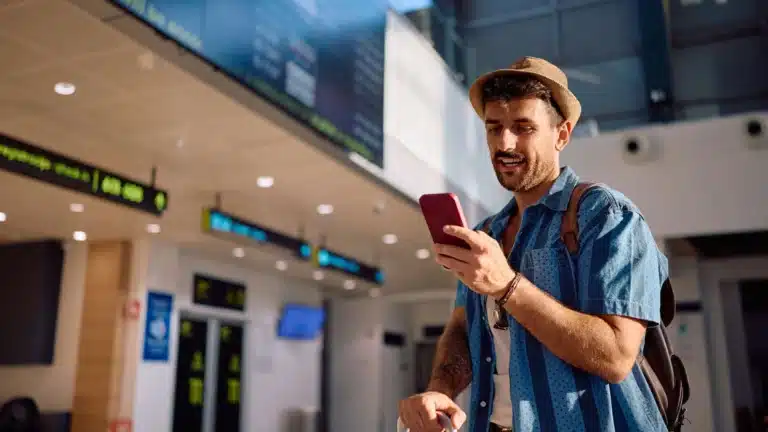Table of Contents
Travel should be about discovery, joy, and new experiences. But for every traveler chasing adventure, someone is looking to take advantage of tourists. Scams are as old as travel itself, and in 2025, they’ve only grown more sophisticated by blending old tricks with new technology.
The good news? With awareness and preparation, you can sidestep most scams and enjoy your journey stress-free. This guide unpacks the top 10 travel scams to avoid in 2025, where they’re most common, and how to protect yourself (and your wallet).
Scam 1: The “Official” Taxi Driver
How it works: At airports, train stations, or popular tourist hubs, fake taxi drivers approach travelers directly, often with convincing IDs or uniforms. They either demand inflated fares mid-ride or take deliberately long routes.
Where it happens: Common in major cities like Bangkok, Rome, and Mexico City.
How to avoid it: Always use official taxi stands, ride-hailing apps like Uber, Grab, or Bolt, or pre-book airport transfers. Confirm the fare before entering the car and insist on the meter.
Scam 2: Fake Booking Websites and Apps
How it works: Fraudulent websites mimic real hotel or airline platforms. Travelers pay for bookings that don’t exist, or their credit card details are stolen. AI-generated sites in 2025 make these harder to spot.
Where it happens: Global, especially when booking budget hotels or flights.
How to avoid it: Book through official airline/hotel websites or trusted aggregators like Booking.com or Skyscanner. Always double-check the domain name and look for “https://”.
Scam 3: Overpriced Currency Exchange
How it works: Currency exchange kiosks in airports, train stations, or tourist hotspots advertise “no commission” but offer terrible exchange rates, sometimes 10–15% worse than the market.
Where it happens: Global — particularly in Europe and Asia.
How to avoid it: Use ATMs from major banks, check live rates on XE Currency, or carry a no-FX-fee credit card.
Scam 4: Fake Tours and Attraction Tickets
How it works: Street sellers or unofficial websites sell tickets to attractions, guided tours, or events. Travelers arrive to find the tickets are fake or grossly overpriced.
Where it happens: Tourist-heavy destinations like Paris (Eiffel Tower), New York (Broadway shows), or Bali (temples).
How to avoid it: Only buy tickets from official sites, verified apps, or trusted tour operators.
Scam 5: Pickpocket Distractions
How it works: Thieves create a distraction, spilling something, asking for directions, or staging an argument, while accomplices pick pockets or snatch bags.
Where it happens: Crowded spaces like Barcelona’s Las Ramblas, Rome’s Termini station, or public buses in South America.
How to avoid it: Keep valuables in money belts or anti-theft bags, stay alert during distractions, and avoid keeping your phone in your back pocket. Read more on Is Making Money Playing Games a Scam? Spot Red Flags.
Scam 6: “Closed Hotel” or “Fully Booked” Ruse
How it works: A taxi driver or tout tells you your hotel is “closed” or “fully booked” and insists on taking you to a “better” (usually more expensive or unsafe) alternative where they get commission.
Where it happens: Southeast Asia, India, and Turkey.
How to avoid it: Call your hotel directly to confirm before accepting alternative offers. Don’t trust unsolicited recommendations from strangers.
Scam 7: ATM Skimmers and Card Swaps
How it works: Criminals install skimming devices or tamper with ATMs to capture card details. In some cases, scammers “help” tourists withdraw cash and swap cards quickly.
Where it happens: ATMs in poorly lit or isolated areas, especially in Eastern Europe and parts of Asia.
How to avoid it: Use ATMs inside banks, cover your PIN, and monitor transactions through your bank app. Consider using Beem’s identity protection to flag suspicious activity.
Scam 8: “Free” Gifts or Bracelets
How it works: A scammer offers a free bracelet, flower, or souvenir, then demands payment once it’s in your hand or on your wrist.
Where it happens: Common near landmarks like the Colosseum in Rome, Sacré-Cœur in Paris, or tourist squares in Marrakech.
How to avoid it: Politely decline unsolicited offers, keep walking, and don’t accept items you didn’t request.
Scam 9: Fake Wi-Fi Hotspots
How it works: Scammers set up free Wi-Fi networks in airports or cafés with names like “Airport_Free_WiFi.” Once connected, they can steal passwords and sensitive information.
Where it happens: Airports, train stations, coffee shops.
How to avoid it: Only use official Wi-Fi networks, confirm names with staff, and use a VPN for sensitive activity. Learn more How to Spot Personal Loan Scams and Frauds: Best Tips.
Scam 10: Ride-Sharing App Impersonators
How it works: Scammers wait outside airports or clubs, claiming to be your Uber/Lyft driver. Unsuspecting travelers hop in, only to be overcharged or worse.
Where it happens: Major U.S. and European cities.
How to avoid it: Verify the license plate, driver photo, and app confirmation before entering the car. Never get into a ride that doesn’t match your booking.
Bonus: Emerging AI and Deepfake Travel Scams
In 2025, scammers will increasingly use AI tools to impersonate customer service agents or create deepfake confirmation emails and calls. Some even clone voices to trick travelers into sharing booking details.
How to avoid it: Never give personal or financial info over unsolicited calls or emails. Always log in directly to your airline or hotel’s official site for verification.
How Much Do Travel Scams Cost Americans?
According to the Federal Trade Commission, U.S. travelers lost an estimated $330 million to travel-related fraud in 2024, a 20% increase from 2022. The average loss per victim was $1,200. While big scams grab headlines, most travelers lose smaller amounts ($50–$300) that add up over time. Being aware of the most common tricks dramatically reduces the risk.
Read: Don’t Get Scammed! How to Spot Fake Grocery Deals
Common Travel Scams and How to Avoid Them
| Scam Type | Where It Happens | How to Avoid It |
| Fake taxi drivers | Airports, stations | Use ride apps, official stands |
| Fake booking sites | Online | Book only via official sites |
| Overpriced exchange | Airports, kiosks | Use bank ATMs, no-FX-fee cards |
| Pickpocket distractions | Crowds, metros | Secure bags, stay alert |
| Fake Wi-Fi hotspots | Airports, cafés | Confirm networks, use VPN |
How Travel Scams Have Evolved Over the Decade
Ten years ago, scams were mostly physical: pickpockets, overpriced taxis, fake souvenirs. By 2025, they’ve gone digital. Fraudsters now use AI to clone booking confirmations, deepfake customer service agents, and even voice-clone relatives to trick travelers into “urgent payments.” Scams are faster, harder to detect, and global. Understanding this evolution helps travelers realize that vigilance isn’t just about guarding wallets; it’s about protecting digital identities too.
Red Flags That Almost Always Signal a Scam
While scams vary, the red flags are surprisingly consistent:
- Pressure to act immediately (“last ticket left,” “final chance”).
- Overly friendly strangers pushing services or gifts.
- Requests for payment in cash only.
- Situations where prices aren’t clear or receipts are refused.
Training yourself to pause and recognize these cues is often enough to stop a scam before it happens.
How to Recover if You’ve Been Scammed
Even the savviest travelers sometimes get caught off guard. What matters is acting fast:
- Contact your bank or credit card company immediately to block or reverse charges.
- Report the incident locally — police reports are often required for refunds.
- Notify your embassy if you’ve lost passports or significant funds.
- Document everything with photos, receipts, and names to strengthen claims.
Quick action doesn’t always recover 100% of losses, but it greatly improves your chances.
Immediate Steps If You’re Scammed Abroad
Getting scammed can feel overwhelming, especially in an unfamiliar country. Having a clear checklist of what to do next ensures you minimize losses and protect yourself from further harm.
| Step | Action | Why It Matters |
| 1 | Stay calm and document (photos, receipts, names) | Evidence strengthens claims with banks/authorities. |
| 2 | Block your card or account immediately via your banking app or hotline | Prevents further fraudulent charges. |
| 3 | File a local police report | Often required for insurance or bank reimbursement. |
| 4 | Contact your embassy/consulate | Assistance with lost documents, major thefts, or emergencies. |
| 5 | Alert your travel insurance provider | Initiates claims for refunds or medical/legal support. |
| 6 | Notify your bank/credit card company | Helps with chargebacks and fraud alerts. |
| 7 | Check identity protection tools (like Beem) | Monitor for compromised data or suspicious activity. |
A quick, decisive response can often turn a total loss into a partial or full recovery.
Why Travel Insurance and Credit Cards Are Your Best Allies Against Scams
Most travelers think of scams as small cash losses, but bigger frauds can cost hundreds or even thousands. This is where travel insurance and credit card protections step in. Many premium credit cards automatically include fraud protection and chargeback rights, meaning if you paid a scammer for fake services, you may get refunded. Meanwhile, travel insurance often covers stolen belongings or fraudulent charges tied to your trip.
For example, if your “official taxi” scam in Bangkok ends with stolen luggage, travel insurance may reimburse your losses. If you buy fake concert tickets online with a credit card, you can often file a chargeback. The combination of insurance and cards acts like a financial shield, by not preventing scams, but softening their blow.
Tools and Apps That Help Detect and Prevent Scams
Technology can protect you as much as it can expose you. In 2025, several tools are indispensable for scam prevention:
- Google Lens: Verify if an attraction ticket or product is authentic by scanning it.
- TrueCaller: Flags suspicious numbers, preventing fake “hotel/airline” calls.
- VPN apps: Protect against fake Wi-Fi hotspots.
- Beem: Monitors suspicious financial activity, blocks unsafe transactions, and provides instant cash flow in emergencies.
Cultural Awareness: Avoiding Misunderstandings vs. Scams
Not every confusing interaction is a scam. In some cultures, bargaining is expected, while in others, refusing a gift is rude. The key is knowing the difference between cultural norms and outright fraud. For example, street hawkers in Marrakech may aggressively sell items, but that’s negotiation, not theft. Travelers who understand local customs are less likely to overreact and more likely to spot genuine scams.
The Cost of Falling for Scams: Beyond Money
Losing $100 hurts, but the bigger cost is often psychological. Travelers report feeling embarrassed, distrustful, and less adventurous after being scammed. This can rob trips of spontaneity and joy. Protecting yourself isn’t just about money; it’s about preserving confidence and curiosity, the real fuel of travel.
FAQs on Top 10 Travel Scams to Avoid
What’s the most common travel scam in 2025?
Fake booking websites and apps have become the most widespread scam globally, driven by AI-generated fake sites. Always book directly with hotels or airlines, or trusted platforms.
How can I spot a travel scam before it happens?
Look for pressure tactics (“buy now”), unsolicited offers, or situations where something seems too good to be true. If you’re unsure, walk away and verify independently.
Do travel scams happen more in certain countries?
Yes, tourist-heavy destinations like Rome, Bangkok, or New York have more scams, but no place is immune. Even in smaller towns, taxi overcharging and fake tours can happen.
What should I do if I fall for a travel scam?
Report it to local authorities, contact your bank immediately if money was involved, and notify your embassy for assistance. Quick reporting increases your chance of recovery.
How can Beem help me protect against travel scams?
Beem offers real-time budgeting insights to spot suspicious charges, Everdraft to cover emergencies if funds are lost, and identity protection to guard against digital scams like fake Wi-Fi or skimming.
Being Aware of Travel Scams
Travel scams are frustrating, but they’re not inevitable. With a little awareness, you can recognize red flags, stay calm, and avoid losing money to opportunists. The goal of travel is to create memories, not regrets, and being scam-smart ensures your experiences remain positive.
Pairing awareness with personal finance tools like the Beem app means you’ll always have both prevention and protection on your side. That way, the only thing you bring home from your trip are stories worth sharing. Consider using Beem to spend, save, plan and protect your hard-earned money like an pro with effective financial insights and suggestions.
Download the Beem app here.














































